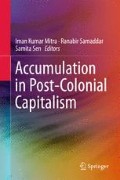Abstract
The objective of the chapter is to understand the new form of government that has come into being. The questions to be asked in this context are the following: What is being governed in the first place—the population or the circuits of capital? What is the relationship between the two? Circuits of capital are generated through forms of infrastructure consolidation (the Indira Gandhi Airport in New Delhi, for example). What makes the monopoly of infrastructure distinct is the emergence of public–private partnerships (PPP). This chapter examines these PPP endeavours, their efficiencies, successes, failures and effects on labour politics and social struggles. There are PPS of the institutional nature and PPPs of the legal nature; this calls for political and legal innovation. Though scholars argue that PPPs are used to break the model of state activity in social sphere and curb its manipulation of social relations, the author argues that PPPs allow the state to restructure itself. The ‘population’ is modelled as a composite of consumers of goods in a profit-base. The PPPs are more than the sum of its public and private parts; they give rise to a distinct mode which operates through a distinct relationship of space, politics and people that influence the market.
Access this chapter
Tax calculation will be finalised at checkout
Purchases are for personal use only
Notes
- 1.
The information on the bidding process and commercial use of land is taken from two case studies of Planning Commission (Secretariat for Infrastructure). Prateek Kuhad, Bidding Process for the Delhi and Mumbai Airports, August 2010; Divya Chawla, Commercial Use of Land at Delhi and Mumbai Airports, August 2010.
- 2.
Steel Authority of India Limited (SAIL) is a state-owned steel company. The case was Steel Authority of India Ltd. versus National Union Water Front on 30 August 2001.
- 3.
Raj Kumar and Others versus Union of India and Others on 5 November 2003, Delhi High Court.
- 4.
Indira Gandhi Airport TDI versus Union of India and others on 28 November 2006, Delhi High Court.
- 5.
M/S Delhi International Airport versus Union of India and Others on 15 September 2011, Supreme Court of India.
- 6.
Indira Gandhi Airport, T.D.I. versus Union of India and Others on 28 November 2006, Delhi High Court.
- 7.
Indira Gandhi Airport TDI versus Union of India and Others on 18 December 2009, Delhi High Court.
References
Bovaird, T. (2011). A brief intellectual history of the public-private partnership movement. In Hodge et al. (Eds.), International handbook on public private partnerships (pp. 43–67).
Chibber, V. (2006). Locked in Place: State-building and late industrialization in India. Princeton: Princeton University Press.
CAG. (2012). Report of the Comptroller and Auditor General of India for the year ended March 2012 on Implementation of Public Private Partnership Indira Gandhi International Airport, Delhi (Report No. 5 of 2012–13). Retrieved March 16, 2016 from http://www.cag.gov.in/sites/default/files/audit_report_files/Union_Performance_Commercial_Implementation_Public_Private_Partnership_Ministry_Civil_Aviation_5_2012.pdf
Datta, A. (2009). Public-private partnership in India: A case for reform? Economic and Political Weekly, 44(33), 73–78.
Flinders, M. (2011). Splintered logic and political debate. In Hodge et al (Eds.), International handbook on public private partnerships (pp. 115–131).
Graham, S., & Marvin, Simon. (2001). Splintering urbanism: networked infrastructures, technological mobilities and the Urban Condition. London: Routledge.
Mao, T.-T. (1965). “On new democracy”. Selected Works (pp. 339–3384, vol. 2). Peking: Foreign Language.
Mezzadra, S., & Neilson, B. (2013). Border as method, or, the multiplication of labor. Durham: Duke University Press.
Mezzadra, S., & Neilson, B. (2014). The state of capitalist globalization. Viewpoint Magazine, 4 September. Retrieved November 10, 2014 from https://viewpointmag.com/2014/09/04/the-state-of-capitalist-globalization
Neilson, B. (2014). Zones: Beyond the logic of exception? Concentric: Literary and Cultural Studies, 40(2), 11–28.
Ong, A. (2006). Neoliberalism as exception: Mutations in citizenship and sovereignty. Durham: Duke University Press.
Planning, C. (2008). Approach to regulation of infrastructure. New Delhi: Planning Commission.
Samaddar, R. (2010). Emergence of the political subject. New Delhi: Sage.
Samaddar, R. (2013). Michel foucault and our postcolonial time. In S. Mezzadra, J. Reid, & R. Samaddar (Eds.), The biopolitics of development: Reading Michel foucault in the postcolonial present (pp. 25–44). Dordrecht: Springer.
Tvarno, C. (2011). Law and regulatory aspects of public-private partnerships: contract law and public procurement law. In G. A. Hodge, C. Greve, & A. E. Boardman (Eds.), International handbook on public private partnerships (pp. 216–236). Cheltenham: Edward Elgar.
Wettenhall, R. (2011). Mixes and partnerships through time. In Hodge et al. (Eds.), International handbook on public private partnerships (pp. 17–42).
Author information
Authors and Affiliations
Corresponding author
Editor information
Editors and Affiliations
Rights and permissions
Copyright information
© 2017 Mahanirban Calcutta Research Group (MCRG)
About this chapter
Cite this chapter
Kumar, M. (2017). Law, Statistics, Public–Private Partnership and the Emergence of a New Subject. In: Mitra, I., Samaddar, R., Sen, S. (eds) Accumulation in Post-Colonial Capitalism. Springer, Singapore. https://doi.org/10.1007/978-981-10-1037-8_3
Download citation
DOI: https://doi.org/10.1007/978-981-10-1037-8_3
Published:
Publisher Name: Springer, Singapore
Print ISBN: 978-981-10-1036-1
Online ISBN: 978-981-10-1037-8
eBook Packages: Social SciencesSocial Sciences (R0)

